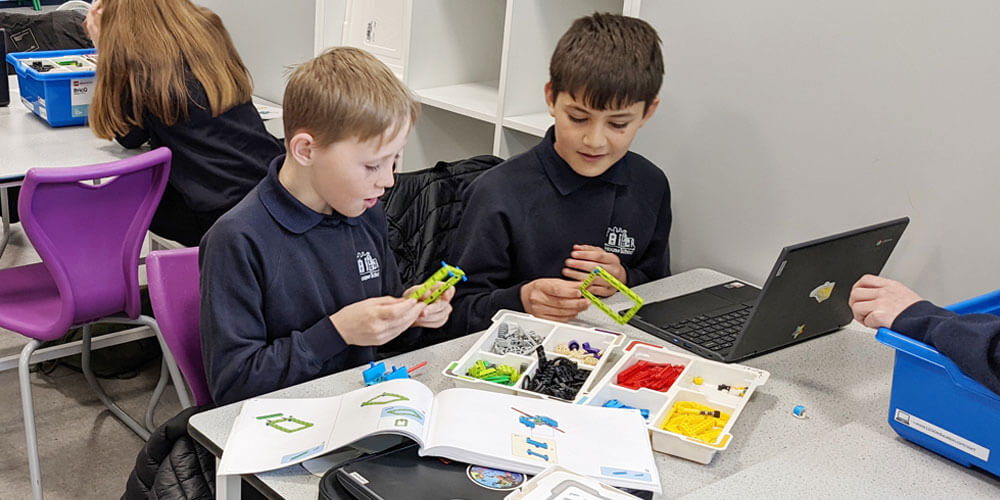Practical Learning refers to learning that is whole - that involves head, heart and hands working in harmony. It occurs when learners experience and navigate real-world challenges and apply their knowledge in a range of settings.
Despite growing recognition of its role in developing critical engineering skills, practical learning has long remained misunderstood and undervalued.
As part of our work seeks to evaluate and reimagine the entry, assessment, and attainment across engineering education, we have sought to tackle practical learning’s mischaracterisation and reimagine the future of whole learning.
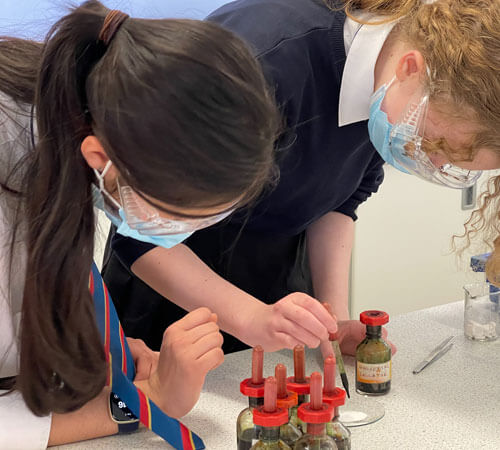
Implementation of practical learning in schools
Between 2019 and 2022, the Royal Academy of Engineering has:
- Worked in collaboration with Professor Bill Lucas and Dr Janet Hanson, from the Centre for Real World Learning at the University of Winchester to begin to explore the benefits of practical learning in secondary schools and examples of promising practice.
- Developed a deeper understanding of practical learning in our 2021 report ‘Reimagining practical learning in secondary schools: A review of the evidence’,
Through this research we found that high-quality project-based, problem-based and inquiry-based learning can be as effective as traditional teaching. Practical learning is crucial to develop qualities like problem-solving and creativity, that make up the Engineering Habits of Mind. The research concluded with a definition of practical learning, and an identification of six characteristics of high-quality teaching for practical learning.
Creating opportunities for practical learning
Since the beginning our work, the consensus around the benefit or practical learning has grown- with the recent Times Education Commission stressing the importance of practical learning in schools alongside knowledge.
However, our report identified a narrowing of the curriculum and declining opportunities to take practical and creative subjects has narrowed the opportunities to do so.
Therefore, this secondary stage of work has sought to help guide schools to create these opportunities, identifying nine examples of promising practice, where practical is balanced with knowledge in the curriculum.
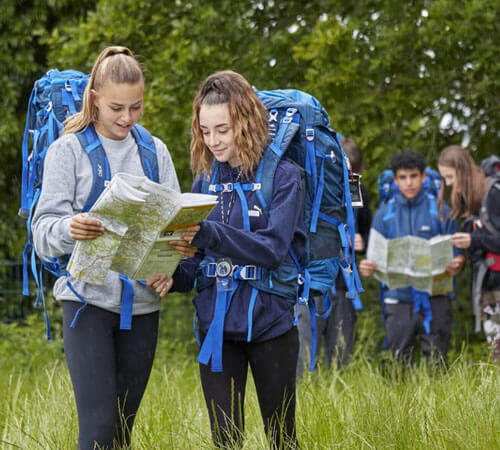
Students from Bohunt school, take part in a practical learning project
Case studies
These case studies showcase how schools can embed practical learning, as they address the largest barrier to practical learning- the current pedagogy- which promotes a false dichotomy between practical versus academic learning.
Rather than a set of prescriptive tools, these case studies serve as inspiration for how to begin to place practical learning into the curriculum, showcasing how a diverse range of schools have approached balancing practical and knowledge rich approaches to learning.
Bohunt School Wokingham, Arborfield, Reading
Headlines
- Integrated STEM
- Outdoor learning
- Rethinking assessment
Bohunt School Wokingham is a mixed 11–16 school, located in Berkshire, that opened in 2016. It is part of Bohunt Education Trust (BET) that comprises eight schools, seven secondaries and one all-through school, all based in the South of England.
Making learning whole across all its schools, BET aims ‘to give all students an outstanding education and develop skills in the classroom and beyond – to help our young people flourish throughout their school career, and into later life.’
All BET schools share a common ethos of ‘Enjoy, Respect, Achieve’ and a common purpose in creating Game Changers, students who make a difference to the world around them. This vision drives the Trust’s approach to its curriculum and teaching and learning, including a focus on integrated STEM, recognising that STEM ‘literacy’ shares an important place in the curriculum, alongside literacy, numeracy, emotional and digital literacy. The integrated STEM curriculum is common to all eight BET schools. Bohunt School Liphook contributed to the research that developed the Engineering Habits of Mind (EHoM) framework, which has also been adopted at Bohunt Wokingham. With so many jobs requiring STEM knowledge and skills, teachers at Bohunt Wokingham realise that in order to create Game Changers who can make a difference, integrated STEM makes sense.
The Derby High School, Bury
Headlines
- Resilience
- Students as leaders
- Cultural capital
The Derby High School is a mixed, 1116 community school located in Bury, Greater Manchester.
Making learning whole underpins The Derby High School’s (TDHS) aims and ethos of creating a RESILIENT school grounded in the 7Rs: ‘We ensure our students are Ready, Respectful, Resourceful, Reasonable, Responsible, create the Right Impression and, most importantly, are Resilient.’
The Derby High School Resilience Curriculum is based on 10 principles that underpin opportunities to engage in practical learning in all areas of the curriculum.
A further important focus for practical learning at TDHS is a commitment to ‘teaching for creativity’ with the use of creative pedagogies that enable young people to experience real world learning and become more aware of their own potential.
The school’s membership of the North West Comino Creative Consortium (NWCCC), a regional partnership of six schools supported by the Comino Foundation, has supported a rich co-creation of learning opportunities and experiences.
Ely college, Ely
Headlines
- Interdisciplinary learning
- PLEDGES Award
- Autonomous learners
Ely College is an 11–18 secondary academy located in Ely, Cambridgeshire. Bishop Laney Sixth Form provides post-16 provision.
The College has been a member of Cambridge Meridian Academies Trust since 2016, now known as Meridian Trust, having merged with Cambridge Primary Education Trust (CPET).
Ely College believes in making learning whole, ensuring academic excellence co-exists with an exceptional commitment to activity beyond school. Within this all-round education, students engage in a high-quality academic experience. It is one in which they are offered a range of character-building opportunities that enhance their learning and development.
The purpose of practical learning at Ely College and Meridian Trust from Year 7 to Year 13 is to enable students to be ready for the next part of their learning experience in life.
Gosport and Fareham Multi-Academy Trust, Gosport
Headlines
- Integrated STEM
- Engineering Habits of Mind
- Employer engagement
Gosport and Fareham Multi-Academy Trust (GFM) is located in Gosport, a coastal town in Hampshire. The Academy is a partnership between two junior schools, two secondary schools, and one specialist SEN secondary school.
A practical STEM curriculum initiative that began in Gomer Junior School is being cascaded across GFM to raise pupils’ progress, attainment, and interest in STEM. This case study explains how the curriculum is being implemented in two of GFM’s secondary schools, Bay House School and Brune Park School.
Many Gosport STEM employers report that young people lack relevant workplace skills, while many GFM students and their parents are unaware of local employment opportunities within engineering. To change this, GFM Executive Head Teacher, Georgina Mulhall, ensured that Gomer Junior became an early adopter of the Engineering Habits of Mind (EHoM) framework. Teachers at Gomer demonstrated that EHoM could be applied to good effect across all areas of the curriculum to enhance pupils’ learning of STEM subjects and develop the transferable skills sought by Gosport’s employers.
GFM’s values emphasise pupils’ futures, and showcase that the skill set associated with practical learning is as important to pupils’ futures as their knowledgebase.
Hethersett Academy, Hethersett, Norwich
Headlines
- Knowledge and culture
- Supporting well-being
- Deliberate practice
Hethersett Academy is a coeducational 11–16 secondary academy sponsored by the Inspiration Trust.
Hethersett Academy’s vision is to ensure that every student achieves their best, both in academic terms and also as a ‘capable and valuable member of the community’.
As a member of the Inspiration Trust family of schools, Hethersett Academy shares a curriculum that has subject specific knowledge at its heart, based on a rich conception of knowledge that includes skills and dispositions. Powerful knowledge is taught ‘so that children can understand, access and influence our society’. Children are also taught to critique the knowledge and apply their thinking to complex problems ‘to strengthen their intellectual resilience’.
The King Alfred School, London
Headlines
- Applied learning
- Culture of trust
- Exhibition of student work
The King Alfred School (KAS) is an independent co-educational day school in London taking pupils from aged 4 to 18.
Since its foundation in 1898, KAS has focused on the education of the whole child. Academic success is something that all KAS students are expected to strive for, but the school also prepares pupils for their futures by developing skills to innovate, create and take risks, so they can have a positive impact on the world.
The King Alfred school website
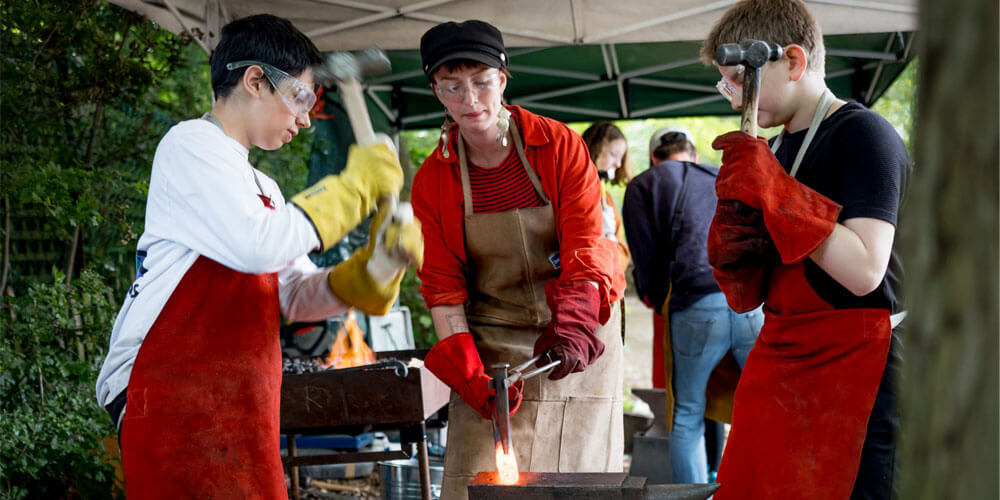
King Ecgbert School, Sheffield
Headlines
- Growth mindset
- Employability
- Real-world problem solving
King Ecgbert School (KES) is a large mixed 11–18 secondary school located in Sheffield, South Yorkshire.
KES is the founding school in Mercia Learning Trust where it has a system-leading role across the Trust. System leading means that the school shares its expertise by supporting other schools across the Trust and more widely across the region.
KES was first accredited in 2017 as a World Class School through the World Class Schools Quality Mark (WCSQM). It was re-accredited in 2021, after being designated World Class School of the Year in 2019.
KES also features as a case study in Tom Sherrington’s book ‘The Learning Forest Fieldbook’.
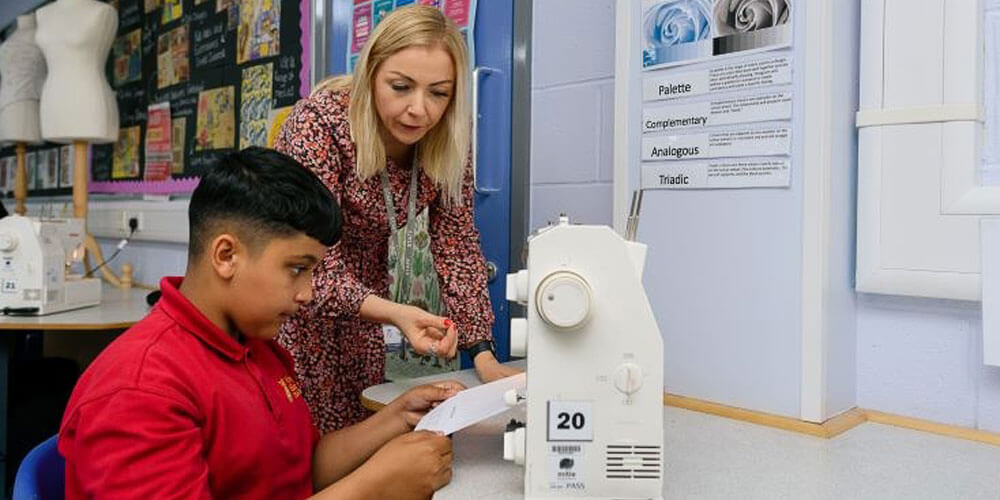
Oakham School, Rutland, East Midlands
Headlines
- FOSIL (Framework of Skills for Inquiry Learning)
- Interdisciplinary learning
- Student teamwork and leadership
Oakham School is an independent coeducational boarding and day school for 10–18 year olds, located in Rutland in the East Midlands.
Oakham School (Oakham) aims ‘to teach our pupils knowledge, skills and values to thrive and confidently contribute at Oakham School and beyond’.
To achieve this aim, the School has been offering the IB Diploma Programme alongside A levels since 2001. It has recently implemented the IB MYP for pupils aged 11 to 13.
Woodfield School, London
Headlines
- Deeper learning
- Cultural capital
- Focus on the arts
Woodfield School is a mixed secondary special school located in London that educates pupils who have moderate, severe and complex difficulties.
The school arranges programmes of work in accordance with each pupil’s education, health and care plan (EHCP). It aims to develop independence and the skills needed for learning and life. Woodfield School is part of Compass Learning Partnership Multi Academy Trust.
Woodfield School is also a senior partner and a hub leader in the Challenge Partnership, a group of over 500 schools in England committed to collaboration to improve pupil achievement and success.

